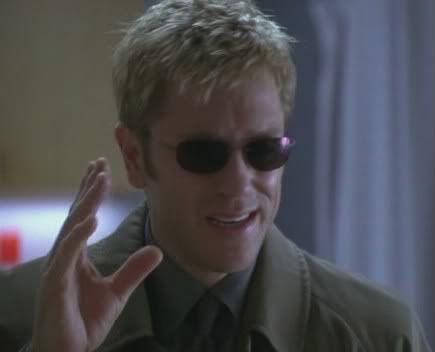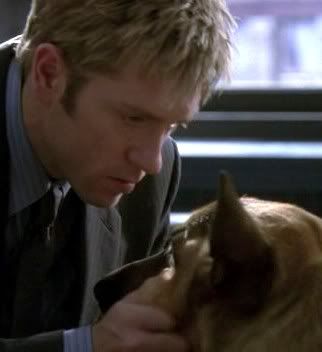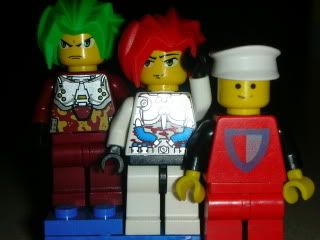Post by maggiethecat on Jul 21, 2005 19:29:48 GMT -5
(For Housemouse, who still has things to say about this amazing episode -- as I hope others do!)
It starts with a dream . . .
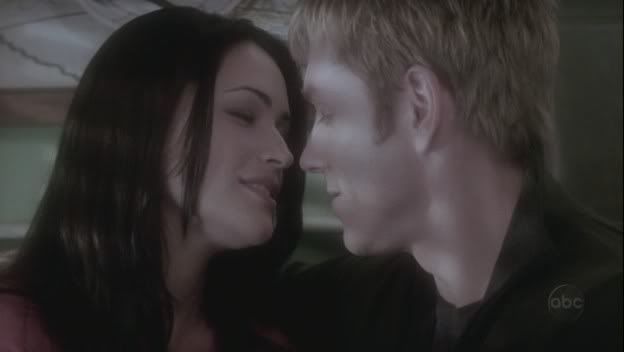
. . . but this time we know it’s a dream. The bleached palette, the slightly drugged tempo, Jim and Christie gazing adoringly into each other’s eyes. Then the shift to nightmare. “We really need you out there, Jimmy.” He goes. Of course he goes – that’s what he does. That’s who he is. Terry Jansen’s there, again, crouched and sweating, and the diner door opens to the silhouette of the shooter and, again, again, the bullet scores across Jim’s temple and he’s jerked from sleep, panicked and disoriented. How many times, and in how many ways, has this scene played out in his dreams? Each dream brings a little death: the first kills the confident sighted cop; the second the easygoing, charismatic lover. And this time, touching on an issue central to the show, Jim walks through the door to face the shooter unarmed. Not the greatest way to start the day. Perhaps the worst possible way to start this particular day . . . .
For me, “Up on the Roof” is as pivotal as “Seoul Man” or “Under the Gun.” I keep coming back to it. While "Seoul Man" is instrumental in resolving a number of crucial issues -- Galloway pronounces Jim fit for duty and releases him from therapy, Jim and Marty begin to resolve their complex rivalry -- "Up on the Roof" is where Jim finally comes to terms with Terry Jansen, and the moment of cowardice that cost him so much. And it’s all so subtly played, the anger simmering under the surface held in check for much of the episode, a tautly scripted journey to the final confrontation by the river.
And of course it’s funny. The exchanges between Jim and Marty are genuinely humorous, for once not characterized by acrimony. “You asleep, Dunbar?” “Just thinking about what to get you for Christmas.” “How about a catapult?” Karen breaks in with, “What are you guys, twelve?” (Well, yeah, sometimes.) And my favorite: “You bowl?” says Marty. “Put those bumpers in the gutter and I’m a killer.” “What about pool, Jim? You play pool?” Slight grin. “Probably not as well as I used to, Marty.” (This is meticulous writing. “Not as well as I used to” is bitter – it’s that one word, probably, that spins the laugh.)
There is much to savor: Glen Semple, Terry’s ham-fisted partner, the antithesis of a “natural” who raises his voice when introduced to Jim. “Glen,” he tells him, “I’m blind, not deaf.” “Out takin’ your dog for a walk . . . Not for nothin’ . . . I’m just sayin’ . . . chillin’ on the futon,” and the delicious exchange with Sellway about black-on-black crime. Watch Fisk’s face whenever Semple speaks – he can’t quite believe what he’s hearing.
About Terry’s partnership with Glen. I have always wondered: Was everyone dead on the street but Terry by the time Jim was wounded? Did anyone else see Terry cowering against the side of that building? Recently in New York a cop was shot three times in the chest (he was wearing a Kevlar vest and lived), while his partner ran from the scene -- he’s been suspended and is “under investigation.” Was there a hidden reason the department teamed Terry with a wheezing old gasbag? Terry does tell Jim that no one else would partner with Semple, but he’s not exactly the soul of honesty. Cops gossip. Maybe, just maybe, Terry’s with Glen because no one wanted to partner up with *him.* Maybe there was something in the wind, an unspoken sense of uneasiness.
Although Jim tells Fisk that working with Terry on the double homicide their respective squads are teaming up on won’t be a problem, his face turns mask-rigid whenever Terry’s around. “Terry was with you when that thing at the bank went down, right?” Marty asks. “Why the bad blood?” “That was a bad day. For everyone,” Jim answers stiffly. He’s not giving it up, not even to Karen, except for one oblique remark about how Terry maybe didn’t “step up” as much as he could have. The groundwork has been laid.

Did anyone else think of the old Carole King/James Taylor song, “Up on the Roof?” I have to think the creators did – enough of them are Baby Boomers to know it:
When this old roof starts a getting me down,
and people are just too much for me to face,
I’ll climb way up to the top of the stairs,
and all my cares just drift right into space . . .
Nice bit of irony, that. No peace on this roof. Nothing on this Rivington Street roof but gunshots and secrets. They’re after the Oliver brothers, Titus and DeShaun, wanted for questioning in a gang-related double homicide. Terry chases Titus up the stairs and onto the roof and two shots are fired, one of them hitting him in the shoulder. Like Jim, we only hear the shots, a sequence he keeps replaying in his head. First Terry’s Browning, then Oliver’s .022. But Terry claims Titus shot first, and Jim keeps gnawing away at it until Terry says, in the hospital, “Jimmy, this is the third time you’ve asked me this.” He backs off . . . but he knows.
Then the bitter argument with Galloway.
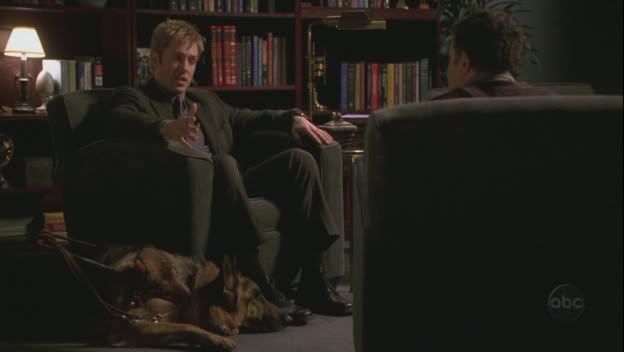
“You were covering for your partner,” Galloway says on Jim’s declaration that he won’t pursue Terry’s staged shooting. And he loses it, incoherent with rage. “He’s not my partner. Terry, he, he, he blew it at the bank—“ Galloway jumps in with, “You mean the roof?” “Right, the roof .” A textbook Freudian slip, and for once the remarkable Galloway gets it wrong. How much do we wish that instead of correcting Jim he had said, “What do you mean, he blew it at the bank?” Did Galloway ever know that a large measure of Jim’s anger had to do with the fact that, while it was his actions, directly, that led to his being blinded, he was taking action because those around him either could not or *would* not? How important would it have been for Galloway to know this? I think very.
The scene at Terry’s house, when his anger boils up, briefly. “You’re not the Jimmy Dunbar I knew.” “Yeah, tell me about it.” “So that’s it, you still have a grudge on me from the bank.” It’s the easy answer, but it’s not the right answer. This is all about not letting Titus Oliver go down for a crime he didn’t commit. The bank was a moment of weakness – this is calculated and dishonest and amoral, and to Jim that’s even worse.
So it's back to the roof for the scene where Karen pulls the rag out of the tar bucket, and Dunbar feels the fabric and quietly says, "This is a handkerchief." The handkerchief Terry folded and used to catch powder burns. Jim opens it out, his fingers finding, one by one, four charred holes. “Oh, man,” Karen says, stunned. Proof.
And then, the powerful final meeting by the river.

The time-stopping moment when Jim pulls out the handkerchief and holds it up to Terry, and Terry’s reponse, “Don’t do this to me, Jimmy.” What a guy – still trying to shift blame with the evidence staring him in the face. The restraint with which Jim confronts Terry is revelatory: he has come to understand Terry in a way he never would have, had Terry not shot himself. This man is a guilt-ridden mess, to say the least. “That day at the bank, that wasn’t me,” Terry cries. But it was, and they both know it. And Jim could have just laid into him, brought him down, had him bounced off The Job with no pension, even brought up on charges, but he offers him a way out. He constructs the accidental discharge scenario as a way to save face and free Titus. Dunbar is a man of honor, and this is the honorable solution for everyone. So well written, so well directed, so well played.
We end as we began, with Jim and Christie. No dream, the reality. It’s the first time we’ve seen them together without tension, relaxed, almost at peace. Her baggage is stowed out of sight, and for once he’s letting her in. It’s lovely. The ending still turns me inside out, every time, Jim lying in her arms. “Are you really through with him?” she asks softly.
“All this time I’ve been so pissed off at him,” he murmurs. “Not just because he froze up at the bank, but because I thought he got off easy. But I think back to that day, and I wouldn’t trade places with that guy.” And then the last line, the killer: “I’d rather lose my sight than my courage.”

He’s starting to move on.
Strong. Subtle. Heartbreaking. Haunting.
Great episode.
It starts with a dream . . .

. . . but this time we know it’s a dream. The bleached palette, the slightly drugged tempo, Jim and Christie gazing adoringly into each other’s eyes. Then the shift to nightmare. “We really need you out there, Jimmy.” He goes. Of course he goes – that’s what he does. That’s who he is. Terry Jansen’s there, again, crouched and sweating, and the diner door opens to the silhouette of the shooter and, again, again, the bullet scores across Jim’s temple and he’s jerked from sleep, panicked and disoriented. How many times, and in how many ways, has this scene played out in his dreams? Each dream brings a little death: the first kills the confident sighted cop; the second the easygoing, charismatic lover. And this time, touching on an issue central to the show, Jim walks through the door to face the shooter unarmed. Not the greatest way to start the day. Perhaps the worst possible way to start this particular day . . . .
For me, “Up on the Roof” is as pivotal as “Seoul Man” or “Under the Gun.” I keep coming back to it. While "Seoul Man" is instrumental in resolving a number of crucial issues -- Galloway pronounces Jim fit for duty and releases him from therapy, Jim and Marty begin to resolve their complex rivalry -- "Up on the Roof" is where Jim finally comes to terms with Terry Jansen, and the moment of cowardice that cost him so much. And it’s all so subtly played, the anger simmering under the surface held in check for much of the episode, a tautly scripted journey to the final confrontation by the river.
And of course it’s funny. The exchanges between Jim and Marty are genuinely humorous, for once not characterized by acrimony. “You asleep, Dunbar?” “Just thinking about what to get you for Christmas.” “How about a catapult?” Karen breaks in with, “What are you guys, twelve?” (Well, yeah, sometimes.) And my favorite: “You bowl?” says Marty. “Put those bumpers in the gutter and I’m a killer.” “What about pool, Jim? You play pool?” Slight grin. “Probably not as well as I used to, Marty.” (This is meticulous writing. “Not as well as I used to” is bitter – it’s that one word, probably, that spins the laugh.)
There is much to savor: Glen Semple, Terry’s ham-fisted partner, the antithesis of a “natural” who raises his voice when introduced to Jim. “Glen,” he tells him, “I’m blind, not deaf.” “Out takin’ your dog for a walk . . . Not for nothin’ . . . I’m just sayin’ . . . chillin’ on the futon,” and the delicious exchange with Sellway about black-on-black crime. Watch Fisk’s face whenever Semple speaks – he can’t quite believe what he’s hearing.
About Terry’s partnership with Glen. I have always wondered: Was everyone dead on the street but Terry by the time Jim was wounded? Did anyone else see Terry cowering against the side of that building? Recently in New York a cop was shot three times in the chest (he was wearing a Kevlar vest and lived), while his partner ran from the scene -- he’s been suspended and is “under investigation.” Was there a hidden reason the department teamed Terry with a wheezing old gasbag? Terry does tell Jim that no one else would partner with Semple, but he’s not exactly the soul of honesty. Cops gossip. Maybe, just maybe, Terry’s with Glen because no one wanted to partner up with *him.* Maybe there was something in the wind, an unspoken sense of uneasiness.
Although Jim tells Fisk that working with Terry on the double homicide their respective squads are teaming up on won’t be a problem, his face turns mask-rigid whenever Terry’s around. “Terry was with you when that thing at the bank went down, right?” Marty asks. “Why the bad blood?” “That was a bad day. For everyone,” Jim answers stiffly. He’s not giving it up, not even to Karen, except for one oblique remark about how Terry maybe didn’t “step up” as much as he could have. The groundwork has been laid.

Did anyone else think of the old Carole King/James Taylor song, “Up on the Roof?” I have to think the creators did – enough of them are Baby Boomers to know it:
When this old roof starts a getting me down,
and people are just too much for me to face,
I’ll climb way up to the top of the stairs,
and all my cares just drift right into space . . .
Nice bit of irony, that. No peace on this roof. Nothing on this Rivington Street roof but gunshots and secrets. They’re after the Oliver brothers, Titus and DeShaun, wanted for questioning in a gang-related double homicide. Terry chases Titus up the stairs and onto the roof and two shots are fired, one of them hitting him in the shoulder. Like Jim, we only hear the shots, a sequence he keeps replaying in his head. First Terry’s Browning, then Oliver’s .022. But Terry claims Titus shot first, and Jim keeps gnawing away at it until Terry says, in the hospital, “Jimmy, this is the third time you’ve asked me this.” He backs off . . . but he knows.
Then the bitter argument with Galloway.

“You were covering for your partner,” Galloway says on Jim’s declaration that he won’t pursue Terry’s staged shooting. And he loses it, incoherent with rage. “He’s not my partner. Terry, he, he, he blew it at the bank—“ Galloway jumps in with, “You mean the roof?” “Right, the roof .” A textbook Freudian slip, and for once the remarkable Galloway gets it wrong. How much do we wish that instead of correcting Jim he had said, “What do you mean, he blew it at the bank?” Did Galloway ever know that a large measure of Jim’s anger had to do with the fact that, while it was his actions, directly, that led to his being blinded, he was taking action because those around him either could not or *would* not? How important would it have been for Galloway to know this? I think very.
The scene at Terry’s house, when his anger boils up, briefly. “You’re not the Jimmy Dunbar I knew.” “Yeah, tell me about it.” “So that’s it, you still have a grudge on me from the bank.” It’s the easy answer, but it’s not the right answer. This is all about not letting Titus Oliver go down for a crime he didn’t commit. The bank was a moment of weakness – this is calculated and dishonest and amoral, and to Jim that’s even worse.
So it's back to the roof for the scene where Karen pulls the rag out of the tar bucket, and Dunbar feels the fabric and quietly says, "This is a handkerchief." The handkerchief Terry folded and used to catch powder burns. Jim opens it out, his fingers finding, one by one, four charred holes. “Oh, man,” Karen says, stunned. Proof.
And then, the powerful final meeting by the river.

The time-stopping moment when Jim pulls out the handkerchief and holds it up to Terry, and Terry’s reponse, “Don’t do this to me, Jimmy.” What a guy – still trying to shift blame with the evidence staring him in the face. The restraint with which Jim confronts Terry is revelatory: he has come to understand Terry in a way he never would have, had Terry not shot himself. This man is a guilt-ridden mess, to say the least. “That day at the bank, that wasn’t me,” Terry cries. But it was, and they both know it. And Jim could have just laid into him, brought him down, had him bounced off The Job with no pension, even brought up on charges, but he offers him a way out. He constructs the accidental discharge scenario as a way to save face and free Titus. Dunbar is a man of honor, and this is the honorable solution for everyone. So well written, so well directed, so well played.
We end as we began, with Jim and Christie. No dream, the reality. It’s the first time we’ve seen them together without tension, relaxed, almost at peace. Her baggage is stowed out of sight, and for once he’s letting her in. It’s lovely. The ending still turns me inside out, every time, Jim lying in her arms. “Are you really through with him?” she asks softly.
“All this time I’ve been so pissed off at him,” he murmurs. “Not just because he froze up at the bank, but because I thought he got off easy. But I think back to that day, and I wouldn’t trade places with that guy.” And then the last line, the killer: “I’d rather lose my sight than my courage.”

He’s starting to move on.
Strong. Subtle. Heartbreaking. Haunting.
Great episode.

